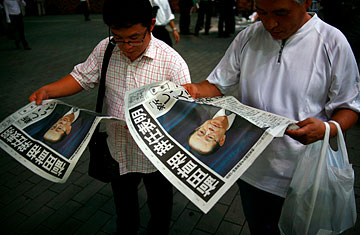
People on the street in Tokyo look over late edition newspapers announcing the resignation of Japanese PM Yasuhiro Fukuda on Sept. 1
Japanese Prime Ministers are organization men: it is not in their job description to stand out. But Yasuo Fukuda was not only colorless but headed a particularly lackluster administration. In the last few weeks, his critics have described him as "dead man walking" and "a lame duck." On Monday, he told them they wouldn't have him to kick around anymore and tendered his resignation.
Fukuda became the second Japanese prime minister in a row to throw in the towel with under a year in office (Shinzo Abe did the same last year) and the third to do so without holding a general election. Few prime ministers have been able to rise to the pop star status of Junichiro "the reformer" Koizumi, whose time in office saw Japan taking a more vocal role in global politics. But Fukuda was quitting for the sake of his organization, the Liberal Democratic Party — and he may have a strategy in mind.
Fukuda's likely successor is Taro Aso, the popular former Minister of Foreign Affairs. The hope is that Aso can not only rekindle the office's appeal but, much more importantly, help break gridlock in parliament, where the LDP heads a coalition in the lower house of the Japanese Diet. Fukuda reshuffled his Cabinet last month to install Aso in the No. 2 spot as the secretary general of Liberal Democratic Party.
The Upper and Lower Houses of the Diet have been paralyzed for more than a year now. In July 2007, the LDP lost the majority it held for five decades in the Upper House to the Democratic Party of Japan (DPJ), the opposition party. Since then, Japanese politics has been rife with indecision. The government has been paralyzed by issues ranging from the appointment of a central bank governor to an antiterrorism refueling mission in the Indian Ocean. Tack on a scandal over millions of dollars in lost pensions, a resumption of the gas tax, higher health insurance premiums for the elderly and the recent flailing and recessionary economy and its no surprise that Fukuda's approval ratings have hovered below 30%.
Fukuda has not said when his resignation takes effect. But if the LDP elects Aso as president, the expectation is that the much-more appealing leadership could restore confidence in the party and help it win the general elections that needs to take place before Sept. 2009. Aso is a political golden boy, in spite of his 67 years, who is known for his love of manga or Japanese-style comic books. Some consider him destined for the top office, given his array of personal ties to former prime ministers and to the Imperial family itself (His brother-in-law is a prince, the first cousin of Emperor Akihito). That higher personality profile, both more elite and more popular, contrasts him with the likely new president of the DJP, Ichiro Ozawa, who, like Fukuda, is not popular. Indeed, two DPJ members of the Upper House formed their own party last week to protest their own party's role in the ongoing Diet gridlock.
Winning the general election is key for the LDP. Divisions between the party and its main coalition partner, the New Komeito party, have been growing. New Komeito is upset at being saddled with an unpopular Prime Minister as well as disapproving of a few of his cabinet choices and wants parliament dissolved in to come up with a whole new government. The DPJ is also pressing for an early dissolution because, it says, Fukuda "threw the administration away" by resigning so soon. Seiji Maehara, vice president of the DPJ, says, "The LDP people hope Aso will be in power," but he says an early general election will just prove that LDP will trot out the same old policies while the DJP has revolutionary ideas that will win it the "reins of power."
There are critics, of course, who see no real change as the ultimate outcome of such political maneuverings. indeed, some fear that the lack of a strong Prime Ministerial candidate will only signal a return to the "revolving door" of national leaders that have made policy-making extremely difficult in Japan.
